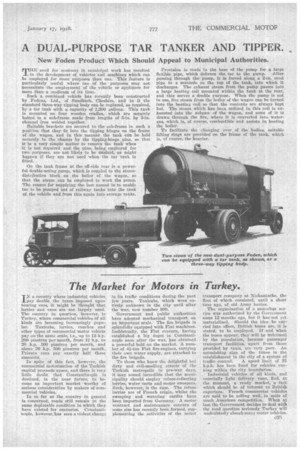The Market for Motors in Turkey.
Page 57

If you've noticed an error in this article please click here to report it so we can fix it.
E.'a country where industrial vehicles, pay double the taxes imposed upon touring cars, it might be thought that lorries and vans are not largely used. The country in question, however, is Turkey, where commercial vehicles of all kinds are becoming increasingly popular. Taxicabs, lorries, coaches and other types of commercial motor vehicle pay on the same scale, i.e., up to 12 h.p. 200 piastres per month, from 12 h.p. to 20 h.p. 309 piastres per month, and above 20 h.p. 590 piastres' per month. Private cars pay exactly half these amounts.
In spite of this fact, however, the commercial Motorization of the Turkish capital proceeds apace, and there is very little doubt that Constantinople is destined, in the near future, to become an important market worthy of Serious consideration by makers of commercial vehicles.
In so far as the country in general is concerned, roads still remain in the same deplorable condition in which they have existed for centuries. Constantineple, however,-has seen a violent change
in its traffic conditions during the past few years. Taxicabs which were entirely unknown in the city until after the war, now number 800.
Government and public authorities have adopted mechanical transport on an important scale. The fire brigade is splendidly equipped with Fiat machines. Incidentally, the Fiat concern, baying established a big depot in Constantinople soon after the war, has obtained a powerful hold on the market. A number of 4i-ton Fiat fire-engines, carrying their own water supply, are attached to the fire brigade. To those who knew the delightful but dirty and evil-smelling streets of the Turkish nietropolis in pre-war days, it may sound incredible that the municipality should employ refuse-collecting lorries, water carts and motor sweepers. Such, 'however, is the case. The refuse lorries are of French origin, whilst the sweeping and watering outfits have been imported from Germany. A motor contract and maintenance concern of some size has recently been formed, supplementing the activities of the motor transport company at .Nichantache, thefleet of which consisted, until a short time ago, of old Army lorries.
The organization of a motorbus service was authorized by the Government some 12 months ago, bot it hasnot yet materialized. Should the idea be carried into effect, British buses are, it is stated, to be employed. If and when the buses appear, they will be welcomed by the population, because passenger transport facilities, apart from those provided by taxis, are very poor. An astonishing sign of the times is tbe establishment in the city of a system of trafficcontrol. A speed limit of 15 k.p.h. has been fixed for vehicles ranfling within the city boundaries.
Industrial vehicles of all kinds, and especially light delivery vans, find, at the moment, a ready market, a fact which should be of interest to British exporters. French commercial vehicles are said to be selling well, in spite of niuch American competition. When at last the Government decides to deal with the road question seriously Turkey will undoubtedly absorb many motor vehicles.












































































































